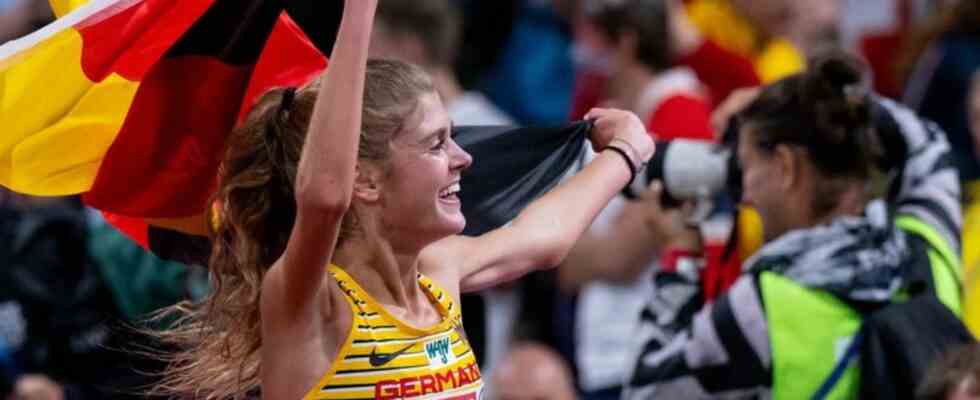Konstanze Klosterhalfen’s unexpected success is representative of the German athletics team’s appearance at the European Championships. It should also go up again at the highest level.
Konstanze Klosterhalfen beamed and laughed after the terrific gold run with the unflagging energy with which she had overtaken the competition at the European Championships in Munich over 5000 meters.
“I felt so good with the first step and I wasn’t tired at any point,” said Germany’s long-distance star at midnight about her 14:50.47-minute triumph. “I won my first international title, and I didn’t even think about a medal. A dream!”
While Klosterhalfen was happily answering questions in the catacombs of the Olympic Stadium late Thursday evening, long jump star Malaika Mihambo suffered a circulatory collapse not far from there after winning silver at the European Championships. The Olympic champion and world champion was the big candidate for the European Championship title, but probably had to pay tribute to a corona infection that she had just survived.
“Of course it’s a shame that it wasn’t enough for gold, I think that’s okay too,” said the 28-year-old in an interview with “sportschau.de” after she collapsed a little later. Mihambos management and the association gave the all-clear hours later. The fact that she still jumped 7.03 meters in the medal fight adds to her performance.
Klosterhalfen still disappointing at the World Cup
Completely unexpected, however, was Klosterhalfen’s title win. Germany’s best long-distance runner has thus become a symbol of German athletics, which is trumps again at the European Championships. At the World Championships in Eugene almost four weeks ago there was a debacle with only two medals and many disappointments.
Things didn’t go well for Klosterhalfen at the World Cup either. The 25-year-old from Leverkusen missed the 10,000 meter final due to a weakened corona disease. Now she won the fifth European Championship gold medal for the hosts, who added five silver medals and one bronze medal over the first four days.
“The athletes wanted to show that they are strong. But you can’t sugarcoat everything,” said Heike Drechsler, Olympic long jump champion in 1992 and 2000, on Sportradio Deutschland. “The World Cup is the benchmark and it should be.” But such an EM gives a lot of impetus.
“Maybe I still had the virus in my body, but I also doubted whether it was really the virus or whether it was the training,” said Klosterhalfen. The doubts were increased because the 10,000 meter race three days earlier at the European Championships did not go well either, but still ended in fourth place.
“Didn’t think twice about not starting”
Her US coach Pete Julian then advised her not to compete in the 5000 meters. “I didn’t think twice about not starting,” said Klosterhalfen. The persistence impressed Julian. He boarded the plane in New York on the morning of the race to be in Munich. “Then I thought: maybe he shouldn’t come,” she confessed.
The spontaneous flight to Munich paid off for coach Julian, with whom Klosterhalfen has been training for three years in the USA and who was part of the Oregon Project. He was hired in 2019 following a doping investigation and a four-year ban from head coach Alberto Salazar. Julian could see his runner overtaking Turkish 10,000m winner Yasemin Can on the penultimate lap, then easily distanced in the final 400m and crossed the finish line with arms outstretched before embarking on the lap of honor with the German flag without a break . “I could have kept running,” said Klosterhalfen, who was constantly driven by a good 30,000 fans.
Number one in Europe just one stage
Sporty things should go even higher. Being number one in Europe is just one step for the four-time German record holder and World Cup bronze medalist from 2019. “The goal remains to beat the world,” announced the dainty, fragile-looking Klosterhalfen energetically. But doesn’t it scare her how African women runners set one world record after another? “On the one hand, yes. But it’s also cool to see what’s possible,” said Klosterhalfen. “I know what’s possible in training and I have a world-class coach who’s trained her. He knows how it’s possible.”
This will and ambition were practically inherited from her cradle. “My dad showed me that everything is possible, and my mom that you always have to get up and stay positive,” said Klosterhalfen, who has been slowed down by injuries to her hips and thighs and Corona in the past two years. “It also builds character if you get through it,” she said.
High jumper Tobias Potye is also convincing
When it comes to ambition, her high jumper Tobias Potye is equal. “Finishing second is always a bit tricky. The goal was a medal,” said the 27-year-old from Munich, who was celebrated like a rock star in his hometown after winning silver with 2.27 meters. In Paris at the latest he wants to defeat the Italian Olympic champion Gianmarco Tamberi, who won with 2.30 meters. “I’ve jumped against Gianmarco a few times this year and thought it was time to beat him,” said Potye. “Now I have to postpone it again, but that will come.”
It was amazing that he had to leave out an important element in training for a long time that would allow him to gain height. “I don’t think most people know that. I haven’t done a technique session in the last two years. It’s obviously difficult to hit every jump,” he said. “I only trained for my knees and jumped in competitions, that was the mission.” Potye fulfilled them – and also surprisingly.

